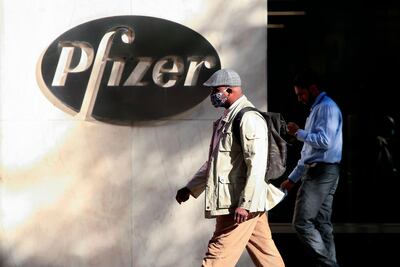Sputnik V Covid-19 vaccine has been more than 90 per cent effective at preventing infections in clinical trials, Russian officials said.
The second phase 3 clinical trial results were announced this week, after Pfizer/BioNTech revealed their vaccine had an efficacy above 90 per cent.
Concerns, however, have been raised that findings of the Russian trials are based on a small number of Covid-19 cases and may not reliably indicate how well the vaccine works.
The Russian Direct Investment Fund, the organisation behind the vaccine programme, said the split of Covid-19 cases between volunteers given the vaccine and volunteers given the placebo – a substance with no effect on the coronavirus – indicated the vaccine was 92 per cent effective.
Sixteen thousand volunteers received the vaccine or the placebo, but the efficacy figure is calculated from 20 cases of Covid-19, a relatively small number.
In total, 40,000 people are taking part in Sputnik V’s phase 3 clinical trials.
Sputnik V was registered by Russia’s health ministry in August, before results from late-stage clinical trials were available.
In October, it was announced that the UAE would host phase 3 trials for the vaccine.
In the announcement this week, officials said “no unexpected adverse events” had been recorded, indicating that the vaccine did not produce severe side effects.
Alexander Gintsburg, director of the Gamaleya Research Institute in Moscow, which developed the vaccine, said the results “convincingly demonstrate Sputnik V vaccine’s efficiency”.

“Thanks to the production scale-up at new manufacturing sites, Sputnik V vaccine will soon be available for a wider population,” he said.
“This will break the current trend and lead to an eventual decrease in Covid-19 infection rates, first in Russia, then globally.”
But some researchers suggested that 20 cases is too few to indicate the vaccine’s effectiveness.
Pfizer/BioNTech’s figures announced this week were based on the results of 94 Covid-19 cases.
Eleanor Riley, a professor of immunology and infectious disease at the University of Edinburgh in the UK, said she worried that the “data has been rushed out on the back of the Pfizer/BioNTech announcement”.
“This is not a competition,” she told a science news service. “We need all trials to be carried out to the highest possible standards.”
She said it was particularly important that people carrying out trials did not “cherry pick” data and the protocols were adhered to. Not doing so risked “a public loss of trust in all vaccines”.
But RDIF said additional Sputnik V vaccination programmes in hospitals involving 10,000 volunteers also found more than 90 per cent effectiveness.
Some researchers welcomed the findings, not least because, unlike the Pfizer/BioNTech vaccine, Sputnik V does not have to be stored between minus 70°C and minus 80°C.
This could make the vaccination programmes easier logistically.
“Overall, this is more encouraging data confirming the early stage protection of a Sars-CoV2 vaccine using a different platform technology,” Prof Brendan Wren, of the London School of Hygiene and Tropical Medicine, told a science media service.
Sputnik V is based on a harmless form of an adenovirus that normally causes influenza.
It has been genetically engineered to stimulate an immune response against the coronavirus.
By contrast, the Pfizer/BioNTech vaccine involves messenger RNA (mRNA), a type of genetic material.
Results from Sputnik V's phase 1 and phase 2 clinical trials were published just over two months ago in the medical journal The Lancet.
Russian officials said they have received requests for more than 1.2 billion doses of the vaccine from more than 50 countries.
There are 11 coronavirus vaccines undergoing phase 3 clinical trials and 36 others are in earlier-stage clinical trials.
Another 147 are in pre-clinical evaluation, meaning they have not been tested on people.









